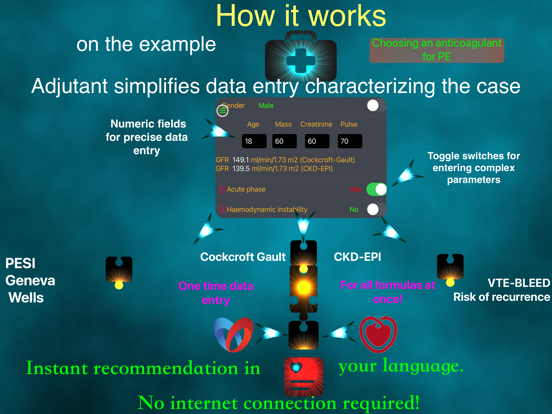
For doctors:
- When choosing an anticoagulant for AF, it speeds up the decision-making process several times. This speed is achieved by using complex variables and all related parameters of all scales and formulas (Cockcroft-Gault, CKD-EPI, HAS-BLED, CHA2DS-VA, ATRIA) are entered once, and not several times for each calculation! Parallel accounting of the presence/absence of ACS. Accounting for the presence/absence of stents in the coronary bed.
Analysis of the interaction of DOACs with concomitant therapy.
Which allows you to get the optimal recommendation. In addition, you are not left with the results of calculations, but immediately receive a recommendation in text form, verified with the latest recommendations. And you do not need the Internet for this!
- When choosing an anticoagulant for PE/DVT, the program calculates all the necessary scales and formulas simultaneously (Geneva, Wells, PESI, Cockcroft-Gault, CKD-EPI, predictive scale of thrombosis recurrence probability, VTE-BLEED, etc.). Can take into account ACS, stenting.
- Algorithm for using rivaroxaban 2.5 mg.
- Collective scale for modifying the risk of bleeding (significant and insignificant).
- Links to various educational events that somehow touch on the topic of anticoagulant therapy or treatment of AF (requires an Internet connection).
For teachers, lecturers, students:
- Allows you to easily and quickly model patients of varying complexity
- Using the application, you can quickly create clinical tasks (thematic)
- Can be useful in mastering recommendations
For patients:
- Simplified calculators for self-monitoring.
- Self-educational information on atrial fibrillation, with different levels of delivery.
Disclaimer.
- the author does not bear any responsibility for the consequences that follow the use of the recommendations generated by the program.
recommendations are advisory in nature and are not a guide to action.
- if you are not a certified medical specialist, then always remember that you should never use the recommendations generated by the program without consulting a doctor!
- if you are a medical specialist, then all responsibility for making a decision in a specific clinical situation lies with you (as always). The programs recommendations are only auxiliary in nature. Only you decide whether to use the information received or not.
Documents:
- 2024 ESC Guidelines for the management of atrial fibrillation developed in collaboration with the European Association for Cardio-Thoracic Surgery (EACTS)
- 2023 ACC/AHA/ACCP/HRS Guideline for the Diagnosis and Management of Atrial Fibrillation
- 2020 ESC Guidelines for the management of acute coronary syndromes in patients presenting without persistent ST-segment
elevation
- 2021 European Heart Rhythm Association Practical Guide on the Use of Non-Vitamin K Antagonist Oral Anticoagulants in Patients with Atrial Fibrillation
- 2020 ACC Expert Consensus Decision Pathway on Management of Bleeding in Patients on Oral Anticoagulants
- 2020 RCS with the participation of: All-Russian Scientific Society of Specialists in Clinical Electrophysiology, Arrhythmology and Cardiac Stimulation, Association of Cardiovascular Surgeons of Russia. Clinical guidelines Atrial fibrillation and flutter.
- 2019 ESC Guidelines for the diagnosis and management of acute pulmonary embolism developed in collaboration with the European Respiratory Society (ERS)
- 2018 Diagnosis and management of acute deep vein thrombosis: a joint consensus document from the European Society of Cardiology working groups of aorta and peripheral vascular diseases and pulmonary circulation and right ventricular function
Scales:
- CKD-EPI (2021)
- GFR according to Cockcroft-Gault
- Geneva scale (revised)
- HEMORR2HAGES
- ABC
- Wells criteria
- PESI
- HAS-BLED
- CHA2DS-VA
- ATRIA
- SCORE2, SCORE2-OP


